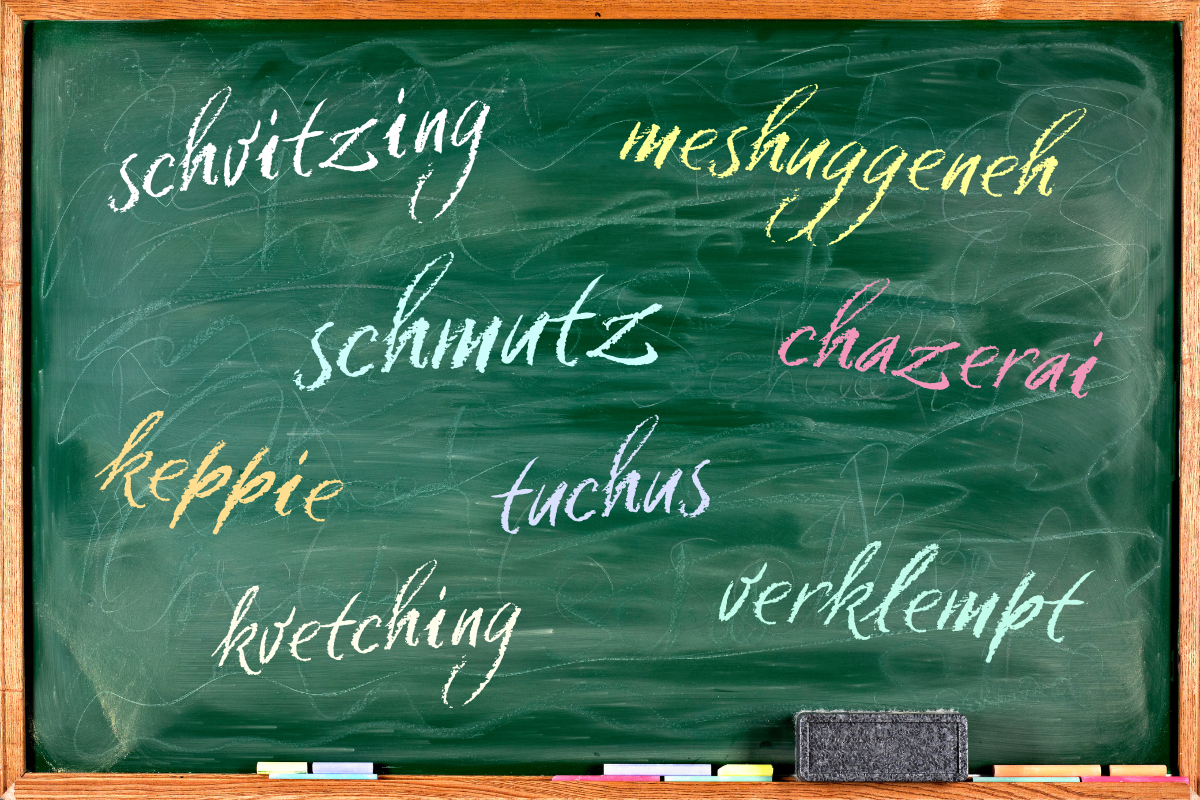I remember the day very well.
My husband came in from walking the dog and asked for a towel.
“He’s got some schmutz,” he said.
I stopped. I stared. He unwrapped himself from the dog’s coiled leash and stepped out of his boots, then turned to me expectantly. “What?” he asked.
“That was your first schmutz!”
This was a big deal. His first Yiddish word! An organic utterance! Completely natural!
He grinned wildly. “And it’s on his tuchus!”
We laughed and high-fived. I texted my family text chain immediately.
Brad said schmutz in natural conversation
Celebration emoji
What a meshuggeneh!
Oy!
I didn’t set out to teach my husband, a tall redhead with Irish Catholic and Scandinavian DNA, Yiddish words deliberately. Rather, they’d come up organically when I was talking, as much a part of my daily lexicon as any English word. We’d sort of marvel at them, little nuggets of my past, of the pasts of my family, and theirs, and theirs: a symbol of something greater — a language, a culture — of which I am a part.
Some of the words, I’d forgotten I knew. Like when Brad was unloading the dishwasher with one of the kitchen cabinets hanging perilously open above his head.
“Watch your kep,” I said, guiding him out from under the cabinet’s sharp corner. I didn’t think anything of it as I opened the fridge, looking for snacks.
“My what?” he said, holding a dripping glass.
“What?”
“What did you just say? My kep?” he tried out the word, enunciating the syllable with effort.
“Oh! Kep! Keppie. It means head.” I pointed to mine, as if he didn’t know what a head was.
“Keppie,” he said quietly, as if committing it to memory.
Brad’s childhood best friend is Jewish, and together they spent several years playing for a Jewish rugby team – the Maccabees – so Yiddish words are not completely new to him. Schmuck, check. Schmekel, definitely check. Goy, of course. He probably got called all of those things! But as any meshuggeneh knows, it would have been all in good fun. He is a mensch, after all.
But what I liked was that he cared about the words; he wanted to know what they meant, how they were used, how they were pronounced. He wanted to get it right. My husband knows a great many things about a great many things: ask him about history, motorcycles, science, religion, biology, theater design, AV, skiing… he could talk for hours, while I slowly fade out. He likes to learn, and his faculty for remembering facts and information is astonishing. So the fact that little Yiddish words come out to my brain and then out of my mouth during everyday life is fascinating for him, a spontaneous learning opportunity every time – which, in turn, is really fun for me.
When I found myself crying over “The Bear,” we were both surprised. The show was both sad and uplifting, but crying was rare. (Okay, that’s not true, I cry often over TV shows but I don’t usually have tears running down my face. )
“I’m so verklempt!” I said as I got up to pour a drink.
“You’re what?” he said. I said the word again, he repeated it, we giggled, while making mental notes to use the word as often as possible from then on. The same conversation that has played out over and over during our two years of marriage played out yet again. It’s always the same:
Me: “Your kvetching is killing me!”
Him: “My what?”
Me: “I gotta go inside, I’m schvitzing like crazy!”
Him: “You’re what?”
And so on, and so forth. (I schvitz a lot, so that one wasn’t tough to figure out.)
Recently, I spent the day with family in Ogunquit, Maine, and was reminded by my aunt of a couple of Yiddish words that I had forgotten. We had intended to spend the day at the beach, but the tide was so high there was no sand. Luckily, there’s a lovely downtown area with shops.
“You want to shmy?” she said to me.
Now, I found myself impersonating my husband. “Do I want to what?”
“Shmy!” she said.
“Shmy?” I said. “I forgot what that means!”
The word was fun to say, quiet in sound but exaggerated to pronounce.
My aunt shrugged playfully. “Walk around, shop around.”
Certainly, I was game to walk around and shop around, particularly with her, from whom I inherited my love of TJ Maxx. Especially because she said she had a shop in mind she thought I’d like.
But after a while of shmying, we still hadn’t found it. We paused in front of a shop that seemed to sell vintage goods, the window filled with things like boom boxes and windbreakers and Christmas ornaments.
I hesitated in front of it, wondering if it could be the one. But she waved her hand around, dismissing it. “I don’t want to go in there. Just a bunch of chazerai.”
Chazerai.
Now this was a gem of a word, one I knew but didn’t know I knew, one that germed its way from the recesses of my brain into a fully formed, living word within nanoseconds.
“Chazerai!” I stopped in my tracks. It was like being young again, in a room with my family, all adults, speaking words I was absorbing but not paying attention to. I felt certain smells and images and memories coming back to me, mostly of my grandparents’ house. They were not connected to the word itself, but rather the part of myself I didn’t access much anymore, except, now, through the beauty of these words. “What’s it mean?”
She shrugged again. “Shit! Nothing.” She’d moved on, gliding by other shop windows, shmying away. I was stopped dead in my tracks. I picked up my phone to text Brad — I couldn’t wait to tell him. Two new Yiddish words! Or something like that. But then my aunt called me on, and I put my phone away, knowing it would be better in person, anyway.
And it was. It’s only been a few weeks, and still, Brad will ask me: “What’s the one again?”
“Chazerai!” I’ll say.
And we’ll sort of smile to ourselves, keeping it close for the perfect usage someday soon. It hasn’t happened yet — but it will.



